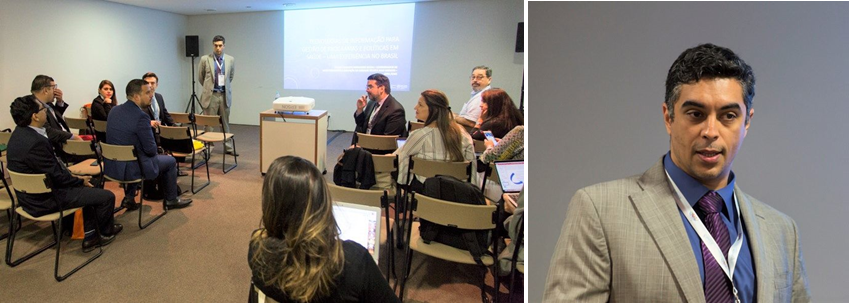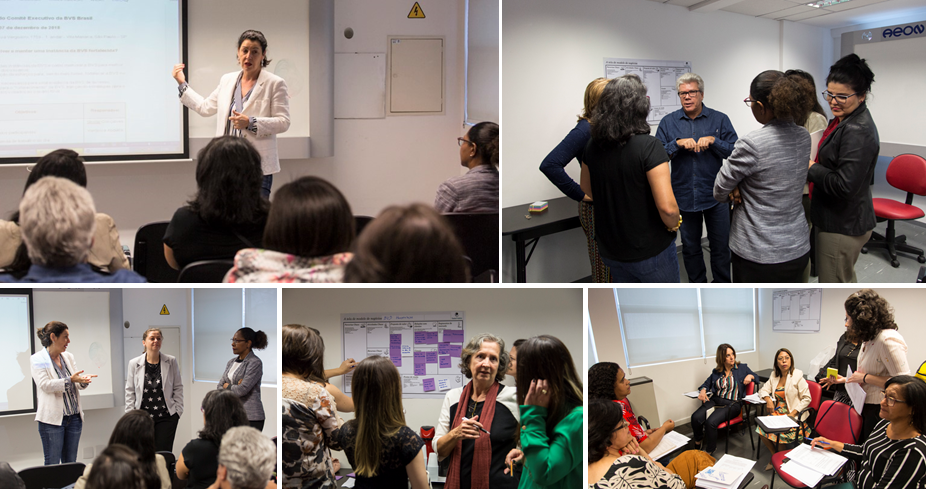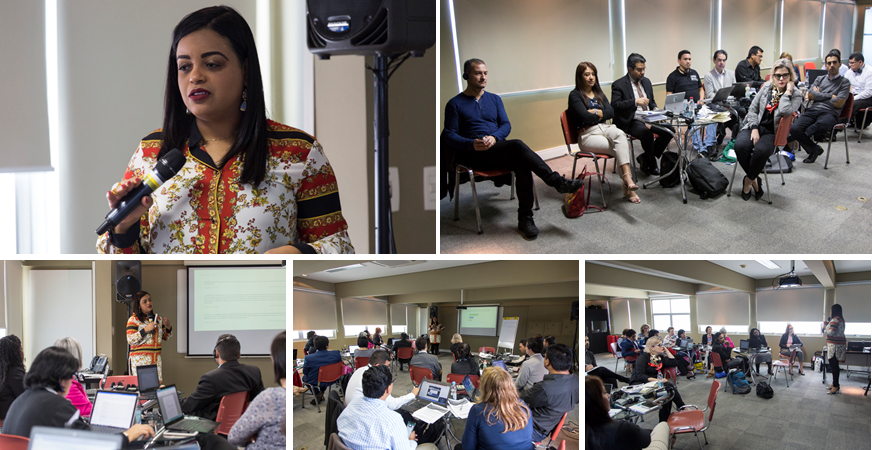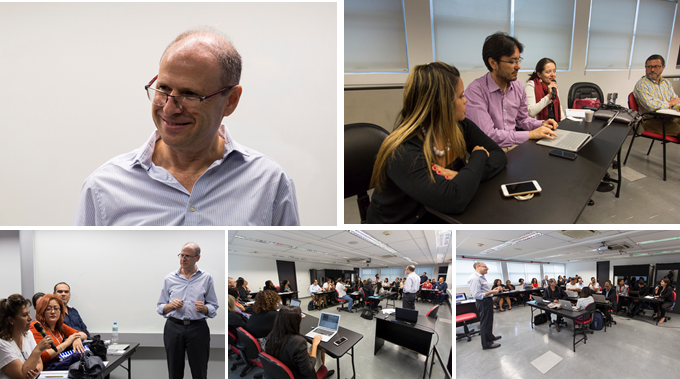CRICS10 included, besides its scientific program and the 7th Regional Coordination Meeting of the Virtual Health Library (VHL7), six satellite events, which were held on December 4 and 7, 2018. These events brought together health professionals, researchers, librarians, information sciences professionals, managers and members of the VHL Brazil and VHL Americas Networks, scientific editors, developers, Knowledge Management focal points in from PAHO/WHO Offices and Centers, representatives from nodes of the PAHO/WHO Virtual Campus of Public Health, and other interested individuals. The recommendations produced in the multiple meetings will be reported in this article.
Scientific Editors Meeting
The Scientific Editors Meeting held on December 4, brought together researchers, editors and information sciences professionals in order to discuss the frontiers and the future of scientific communication in Latin America and the Caribbean, through topics such as indexing criteria for the LILACS database, quality of scientific publications, research ethics and reproducibility, the increasing use of open science practices (open access, open peer review and open data) in management and scientific journal publications, and the ubiquitous use of social networks to disseminate research and evaluate its impact. At the closing of the session, a panel of experts discussed the perspectives and potential benefits and of open science practices and the future of scientific communication in the countries of the Region.
 From this meeting, the following recommendations were put forward, which are available at the conference website.
From this meeting, the following recommendations were put forward, which are available at the conference website.
IV RedDes Meeting
The IV RedDes Meeting (also on December 4, simultaneous to VHL7) brought together professionals from the field of technology that use and collaborate with the development of technological and methodological solutions for the VHL and associated initiatives, with the objective of sharing advances in the area and strengthening the network. The presentations that took place throughout the day were divided into four axes, which directed the recommendations put together by the group.
 Renato Murasaki, Information Methodology and Technology Manager from BIREME, celebrates the success of the event. “We achieved our objective of generating important recommendations that will serve to guide BIREME and all institutions and people that participate in the Network of Developers of the VHL and of its associated networks”, he remarks.
Renato Murasaki, Information Methodology and Technology Manager from BIREME, celebrates the success of the event. “We achieved our objective of generating important recommendations that will serve to guide BIREME and all institutions and people that participate in the Network of Developers of the VHL and of its associated networks”, he remarks.
The recommendations consolidated from the four thematic axes of the IV RedDes Meeting are published at the CRICS10 website.
Primary Health Care
Primary Health Care (PHC) was the main theme of the satellite event “Use of information technologies for strengthening of PHC: experiences from the Region of the Americas”. The objective of the meeting was to share regional experiences on strategies for strengthening PHC. “The idea is to create partnerships that will guarantee the exchange of successful experiences that contribute to the guidelines of universal health coverage through primary health care”, explains Thiago Hernandes, from the Pan American Health Organization (PAHO), invited speaker in the meeting.
 The panel consisted of presentations delivered by representatives from Costa Rica on the system of electronic health records at use in the country; from the United States, on strategies for strengthening primary care through monitoring; from Peru, on the use of telemedicine for increasing capacities in primary care; and from Brazil, on the use of information technologies for managing, monitoring and evaluating political programs in health, as is the case of the Mais Médicos Program.
The panel consisted of presentations delivered by representatives from Costa Rica on the system of electronic health records at use in the country; from the United States, on strategies for strengthening primary care through monitoring; from Peru, on the use of telemedicine for increasing capacities in primary care; and from Brazil, on the use of information technologies for managing, monitoring and evaluating political programs in health, as is the case of the Mais Médicos Program.
The group came up with six recommendations from the discussions held throughout the day, which are published at the conference web site
VII Meeting of the Executive Committee of VHL Brazil and Meeting of the National Committee of the BiblioSUS Network
The VII Meeting of the Executive Committee of VHL Brazil was held on December 7, 2018, in São Paulo. The main theme of the event was the question: How to develop and maintain a strong VHL instance? The session gathered technical coordinators of Brazilian thematic and institutional instances.
Divided into groups, participants faced the challenge of creating a business canvas for the VHL instance of a member of the group, showing its strengths and weaknesses. The main goal of the exercise was to extract valuable proposals that attend and potentiate the main desired objectives, before focusing on a plan of action.
 Based on the reflection promoted by the canvas, the Objectives and Key Results (OKR) methodology was put into action. The methodology was presented to the groups and one of the five proposed themes was chosen. Thus, the groups identified Objectives and Key Results related to the theme and applicable to all instances of the Network. The groups were also invited to propose activities that could help attain the OKRs, and so activities for the first semester or 2019 were structured.
Based on the reflection promoted by the canvas, the Objectives and Key Results (OKR) methodology was put into action. The methodology was presented to the groups and one of the five proposed themes was chosen. Thus, the groups identified Objectives and Key Results related to the theme and applicable to all instances of the Network. The groups were also invited to propose activities that could help attain the OKRs, and so activities for the first semester or 2019 were structured.
The session was evaluated positively by participants, who identified the use of the new work methodology and the opportunity to exchange experiences with other instances as the main strong points of the meeting. Furthermore, the results obtained during the session will help to identify strategies for strengthening initiatives in the context of the VHL, as well as to define a work plan with goals and strategies for 2019 and upcoming years.
Approximately 30 coordinators and representatives from VHL instances in Brazil and from the BiblioSUS Network participated in the Workshop, which was facilitated by consultant Claudia Guzzo. Representatives from BIREME and from the General Coordination of Documentation and Information from the Ministry of Health (CGDI/MS) followed the Workshop’s discussions and recommendations.
Meeting of PAHO/WHO Focal Points in Knowledge Management (K-Centers)
The Meeting of K-Centers was led by Eliane Pereira dos Santos, Knowledge Management and Networks Advisor from the department of Knowledge Management and Publications of PAHO/WHO. Twenty-two focal points were present, from the following Representations and Specialized Centers of PAHO/WHO: Argentina, Brazil, Colombia, Costa Rica, Cuba, Dominican Republic, Ecuador, Guyana, Guatemala, Honduras, Jamaica, Mexico, Nicaragua, Panama, Puerto Rico, Venezuela, the Latin American Center of Perinatology, Women’s Health and Reproductive Health (CLAP), the Latin American Center for Foot and Mouth Disease (Panaftosa) and BIREME.
 The meeting was also attended by the coordinator of the Library of the World Health Organization (WHO), Ian Roberts, who recognized the work and the important responsibility of K-Centers in the Region of the Americas for the fulfillment of activities in knowledge management and information access.
The meeting was also attended by the coordinator of the Library of the World Health Organization (WHO), Ian Roberts, who recognized the work and the important responsibility of K-Centers in the Region of the Americas for the fulfillment of activities in knowledge management and information access.
During the meeting, the Final Report of the Regional Strategy in Knowledge Management and Communications (CSP28/R2) was presented; the main projects and achieved results in 2018 were discussed, as well as the joint agenda for 2019, with the new PAHO/WHO Strategic Plan for 2020-2025 in view.
OER VCPH-BIREME Network – Workshop 2018
The Workshop of the Virtual Campus in Public Health (VCPH)-BIREME was attended by 30 participants, representing the different nodes of the Virtual Campus, including the technical team of the VCPH, academic institutions of the Region able to impulse Open Educational Resources (OER), and professionals that presented noteworthy work on the topic in 2018.
 The meeting, led by Gabriel Listovsky, Regional Coordinator of the VCPH – PAHO/WHO based in Panama, had as a central topic open educational resources within the framework of the 2030 Agenda for sustainable development and the human resource strategy for universal health. The topic of development and strengthening of the OER Network of the Virtual Campus in Public Health (VCPH) – BIREME 2018-2019 was also discussed.
The meeting, led by Gabriel Listovsky, Regional Coordinator of the VCPH – PAHO/WHO based in Panama, had as a central topic open educational resources within the framework of the 2030 Agenda for sustainable development and the human resource strategy for universal health. The topic of development and strengthening of the OER Network of the Virtual Campus in Public Health (VCPH) – BIREME 2018-2019 was also discussed.
Furthermore, a proposal for updating the Strategy of Open Educational Resources (OER) among the member institutions on the country nodes of the VCPH was presented, along with BIREME’s Integrated System of Referential Information Source Management (FI-Admin), now used as the management system for OER repositories of the VCPH/VHL. Actions for strengthening the Network in 2019 were also discussed.